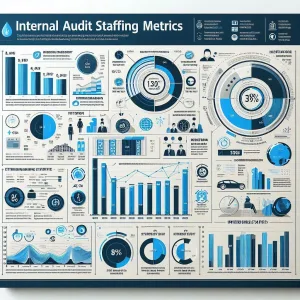As organizations increasingly embrace information technology outsourcing to enhance efficiency and reduce costs, they must also confront the associated cybersecurity risks. Internal auditors play a pivotal role in ensuring that these outsourcing arrangements are secure and compliant. This guide delves into the cybersecurity challenges posed by IT outsourcing and provides actionable insights for internal auditors and IT security professionals [1].
What is IT Outsourcing?
IT outsourcing refers to the practice of contracting with third-party providers to manage and maintain an organization’s IT systems, applications, or infrastructure. This can encompass services such as network management, data center operations, cybersecurity, and software development [2]. The primary motivations for IT outsourcing include:
- Cost savings: Reducing operational expenses by leveraging external expertise.
- Increased efficiency: Allowing internal teams to focus on core business functions.
- Access to specialized expertise: Gaining insights from vendors with advanced technological capabilities.
The Growing Trend of IT Outsourcing
The demand for information technology outsourcing has surged over the past decade, driven by the need for organizations to remain competitive in a rapidly evolving digital landscape. A significant percentage of companies have outsourced some or all of their IT functions, with many more planning to follow suit in the near future [3].
The Role of Internal Audit
Internal auditors are essential in managing the risks associated with information technology outsourcing. Their responsibilities include [4]:
- Assessing outsourcing agreements: Evaluating the effectiveness of contracts and ensuring alignment with organizational objectives.
- Evaluating security controls: Verifying that external vendors implement robust security measures to protect sensitive data.
- Monitoring compliance: Ensuring adherence to regulatory requirements and industry standards.
Key Considerations for Internal Auditors
When evaluating IT outsourcing arrangements, internal auditors should consider the following [5]:
- Contract review: Ensure contracts are comprehensive and aligned with organizational goals.
- Security assessments: Verify that vendors have implemented strong security controls.
- Compliance monitoring: Regularly check compliance with regulations and internal policies.
Cybersecurity Risks Associated with IT Outsourcing
As organizations rely more on IT outsourcing, they expose themselves to various cybersecurity risks. Key concerns include:
- Data breaches: Sensitive information shared with vendors can be vulnerable to unauthorized access, theft, or loss.
- Lack of visibility: Organizations may lose oversight of vendor activities, increasing the risk of security incidents.
- Insider threats: Malicious or negligent behavior by outsourced staff can compromise security.
To mitigate these risks, internal auditors should [6]:
- Assess vendor security controls, including incident response plans and data protection measures.
- Ensure contracts include monitoring and reporting requirements.
- Recommend robust vendor management practices, including regular audits and penetration testing.
Common Cybersecurity Challenges in IT Outsourcing
Organizations face several cybersecurity challenges when outsourcing IT functions [7]:
- Vendor management: Selecting vendors with strong cybersecurity practices is crucial.
- Risk assessment: Conducting due diligence on third-party vendors is essential to identify potential risks.
- Regulatory compliance: Ensuring vendors adhere to relevant laws and standards is vital.
Best Practices for Internal Auditors to Mitigate Cybersecurity Risks
To effectively mitigate cybersecurity risks associated with information technology outsourcing, internal auditors should adopt the following best practices [8]:
- Develop a vendor management program: Establish criteria for evaluating vendors’ cybersecurity capabilities and create standardized contract templates.
- Conduct regular risk assessments: Identify vulnerabilities in vendor-managed systems and schedule periodic audits of security controls.
- Implement incident response plans: Ensure organizations have comprehensive plans for addressing cybersecurity incidents and disaster recovery procedures.
FAQ
Q1: What should internal auditors look for in vendor contracts?
A1: Internal auditors should ensure contracts clearly outline security responsibilities, compliance requirements, and monitoring obligations.
Q2: How can organizations assess vendor security controls?
A2: Organizations can conduct regular audits, request security certifications, and evaluate incident response plans to assess vendor security controls.
Q3: What are the best practices for ongoing vendor management?
A3: Best practices include regular performance reviews, risk assessments, and maintaining open communication with vendors regarding cybersecurity threats.
Key Takeaways
- IT outsourcing presents both opportunities and challenges for organizations.
- Internal auditors must prioritize cybersecurity in outsourcing decisions.
- Regular monitoring and assessment of vendor performance are crucial for mitigating risks.
Conclusion
In conclusion, the landscape of information technology outsourcing is fraught with cybersecurity risks that require diligent management. Internal auditors must take proactive measures to ensure that outsourcing arrangements are secure and compliant. By prioritizing cybersecurity, engaging with vendors, and implementing best practices, organizations can protect sensitive information and maintain a competitive edge in an increasingly digital world. The role of internal auditors is vital in navigating these complexities and fostering a culture of cybersecurity awareness within organizations.
Find out more about Shaun Stoltz https://www.shaunstoltz.com/about/
This post was written by an AI and reviewed/edited by a human.



